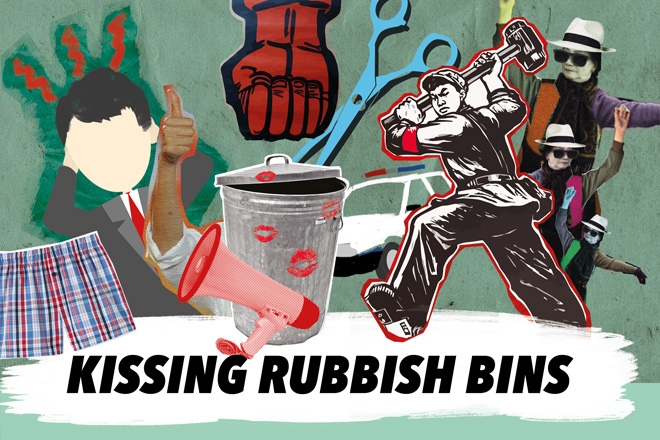While some may complain about being fed up with clichéd team-building activities; starting the day with a scavenger hunt, spending the afternoon in a boring keynote speaker session and heading home with cheap coffee mugs emblazoned with a company logo, you might just feel lucky after learning of the extreme measures some Chinese companies take to foster so-called “team spirit”.
Earlier this year, the dancing “da mas” (old ladies) on Nanjing’s Heyan Lu were upstaged by a maddened crowd of young people. It was just after 20:30. when 11 young men and women gathered in a nearby square and started to shout, “Yes, we can! Yes, we can!”, repeatedly as if under a spell.
Standing to attention on a freezing winter night, these young people seemed unaffected by the cold and warmed by each other’s passion. One man who seemed to be the leader of the bunch stepped out and exclaimed to those gathered; “Is Jack Ma rich?” The fervent crowd shouted their answer; “Yes!”
“Can we beat him?”
“Yes, we can!”
The leader went on to demand increasingly more outrageous behaviour. “Who would like to kiss the rubbish bin over there?”
“Me!”, a young lad volunteered.
To the astonishment of the ladies nearby and everyone else in the vicinity, he rushed to a nearby litter receptacle and offered it a gentle peck.
The crowd continued to shout slogans until, all of a sudden, everyone lay down on the cold, hard ground, upon an order given by the leader.
“I think they are crazy”, one of the old ladies commented. So did many residents nearby and one of them eventually reported the strange antics to the local police.
The overexcited crowd began to cool down when authorities arrived at the scene. The leader told the police that they all belong to the sales team of a company nearby. Their jobs involve selling products door to door.
“These are newbies, fresh out of college”, said the leader. “They are too shy and timid. That’s why we are pushing their limits.”
The company concerned did not offer verification of the claim but online search results show that the firm is notorious for their so-called “creative training methods” for new recruits.
In China, similar motivational steps are adopted by a number of small companies that struggle to survive, especially sales companies, restaurants and hair salons. Apart from the most common approaches that are physical exercise and singing emotional songs together, there are also many other imaginative techniques employed to train young recruits, some of which date back many years.
On 15th April, 2005, a hair salon in Nanjing made their employees kneel down and “worship” passersby during rush hours on Shuiximen Da Jie.
In 2014, a sales company in Guangdong forced their employee to run 5 kilometres on the street in their underwear as a punishment for failure to reach an annual sales target.
One of the employees said he did not mind because he was told that billionaires all went through humiliations like this once.
Closer to home, in our neighbouring Zhejiang province, in April 2015, a web-technology development company made its employees climb the local Huangren mountain in the middle of the night, again for not reaching a sales goal. They were also required to come to work by 5 in the morning and stand up while making phone calls.
Also in Zhejiang, a company in Ningbo made a new rule for all those in management to shave their head. Those who followed the rule would receive a ¥10,000 reward (but must shave every month to remain bald), while those who refused to obey the rule were fired or required to pay a ¥10,000 fine.
Another hotpot restaurant in Shenyang City asked its employees to kneel down to their boss while shouting slogans.
The restaurant said this scene was caught on tape for the purpose of propagating their unique corporate culture. Others brazenly claim that actions such as making their employees do push-ups, running marathons and even crawling on the street can help them reach their full potential and boost morale.
How do employees react to these incentives? When I threw this question to Xiao Li, my hairdresser, he smirked.
“Would you like to start the day with 50 jumping jacks on the street at 06:00 before heading back to wash 50 customers’ heads for the day?”
Wen Qing, an expert from the Nanjing 12355 Psychology Hotline said these so-called “motivations” are simply just wrong, and merely make employees feel frustrated and embarrassed.
“It can be even seen as humiliation of employees that further creates a negative impact on the company’s image”, Wen added.
Some years ago it was reported that quite a number of Chinese companies designed military-training programmes for fledging young recruits. “The goal isn’t to make the employees battle-ready, but to instil in them a sense of collectivism and obedience,” one of the anonymous trainers said of the programs. A main goal was to “temper willpower”.
Despite what these companies claimed, the whole purpose of team building activities should be to enable better communication, better relationships and ultimately increase productivity in the office.
If a company truly strives to be successful, perhaps some time could be spent thinking about more worthwhile and encouraging methods of motivation, ones that do not involve kissing a rubbish bin. That would certainly be better than complaining about how mean your boss is.











